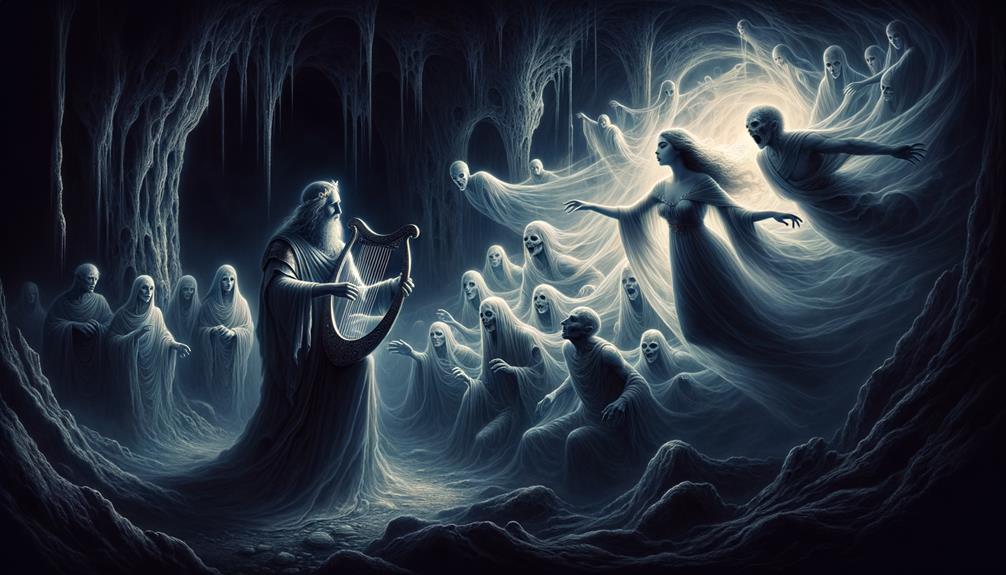The tragic Greek legend of Orpheus and Eurydice centers around undying love's struggle against fate. As a skilled musician, Orpheus descended into the shadowy underworld to retrieve his wife Eurydice after her untimely death. Through melancholic songs, he swayed even the grim ruler Hades to allow Eurydice's return – on one condition: Orpheus must not look back until they reached the surface. Unfortunately, doubt crept in, and one fatal glance backwards sealed Eurydice's fate, banishing her forever. This timeless tale captures the fragility of humanity's existence while highlighting love's resilience against divine trials. Generations have found resonance in Orpheus's heroic quest and the haunting sorrow of love lost.
The Tale of Orpheus
Orpheus, celebrated musician, embarked on a harrowing quest to the underworld to reclaim his cherished Eurydice. Consumed by love and grief, I couldn't fathom an eternity without her. I delved into Hades' shadowy realm, unflinching in my determination to reunite with my love. My haunting melodies so stirred the grim ruler's heart that he consented to Eurydice's return, but with one strict caveat: I must not glance back until we reached the surface.
This iconic love tale lays bare the depths of my devotion, the extreme measures I'd take for the woman I adore. Navigating the underworld tested my mettle, epitomizing the hero's journey. Each step brimmed with hope and dread as I trusted Eurydice followed unseen. My music, love's enduring emblem, reverberated through those gloomy corridors.
The myth encapsulates humanity's most profound emotions—love, yearning, and disobedience's tragic costs. An ageless reminder of love's intricacies and the toll we sometimes pay.
Eurydice's Tragic Fate
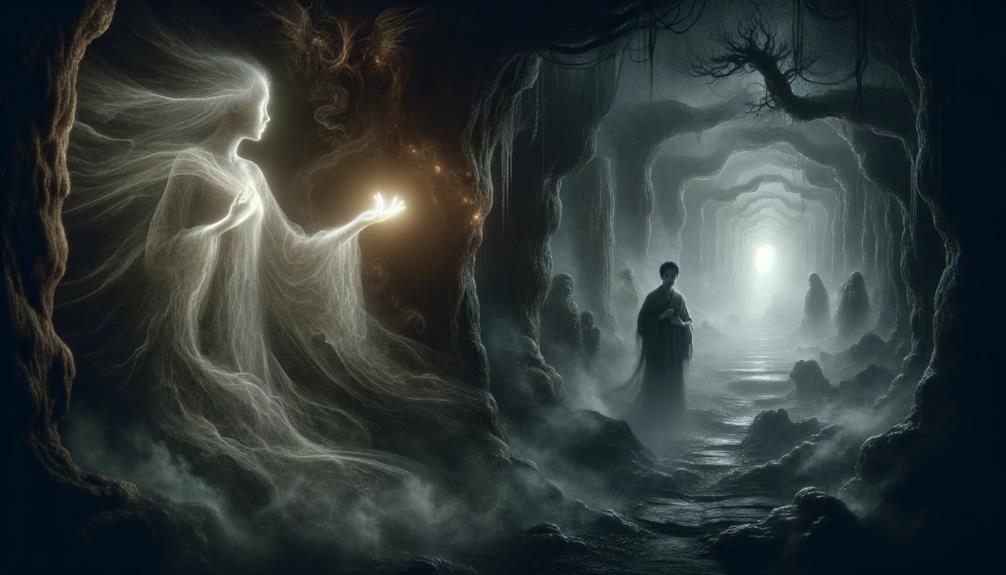
Within the gloomy depths of the underworld, Eurydice's heartbreaking destiny was etched by a single, fateful glance. The myth of Orpheus and Eurydice unveils a tale where Orpheus, a gifted musician born to Apollo, embarks on a perilous journey into Hades' domain to reunite with his beloved Eurydice. Tragically, she had perished from a snakebite shortly after their wedding, leaving Orpheus inconsolable and driven to challenge death itself.
Moved by Orpheus' melancholic melodies, Hades offered him a chance to reclaim his wife, but with a cruel condition: Orpheus must not turn to gaze upon Eurydice until they both emerged from the underworld. As they ascended, tension lingered, Orpheus acutely aware of her presence behind him, yet doubt began gnawing at his resolve.
In a moment of overwhelming uncertainty, Orpheus faltered, glancing back. That single act sealed Eurydice's fate, condemning her to remain in the underworld eternally. Her tragic end serves as a sombre reminder of trust's fragility and the devastating toll of doubt. The myth of Orpheus and Eurydice endures as a timeless narrative exploring love, loss, and the human condition's complexities.
Journey to the Underworld
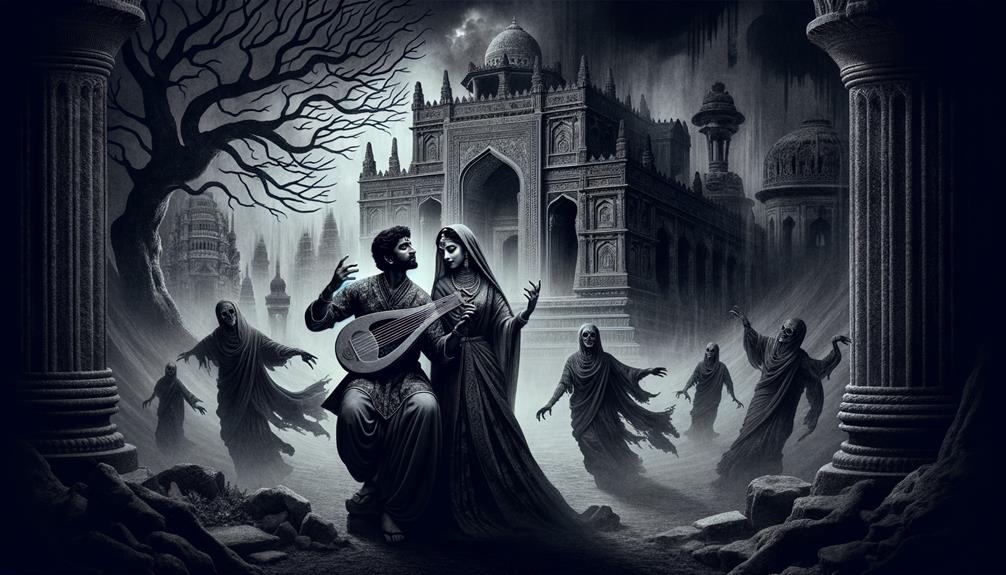
Fueled by unwavering love and a stubborn determination forged from grief, I embarked on a treacherous journey into the shadowy underworld, driven to rescue Eurydice from death's grasp. Each step deepened the ache in my heart, but facing Hades himself was necessary to bring her back. Spectral whispers and the chilling presence of lost souls haunted the perilous path.
Strumming my lyre, I played sorrowful melodies that reverberated through the underworld's halls. Infused with sorrow and hope, my music reached the ears of Hades and Persephone. Although stern and unyielding, the king and queen were moved by my mournful tunes. Hades offered me a chance to revive Eurydice under one strict condition: I must not look back at her until we both reached the surface.
The return journey tested my faith and patience. I sensed Eurydice's presence, but the urge to look back overwhelmed me. Anticipation filled every step as the boundary between life and death neared. This journey challenged the very core of my love and resolve.
The Fatal Glance
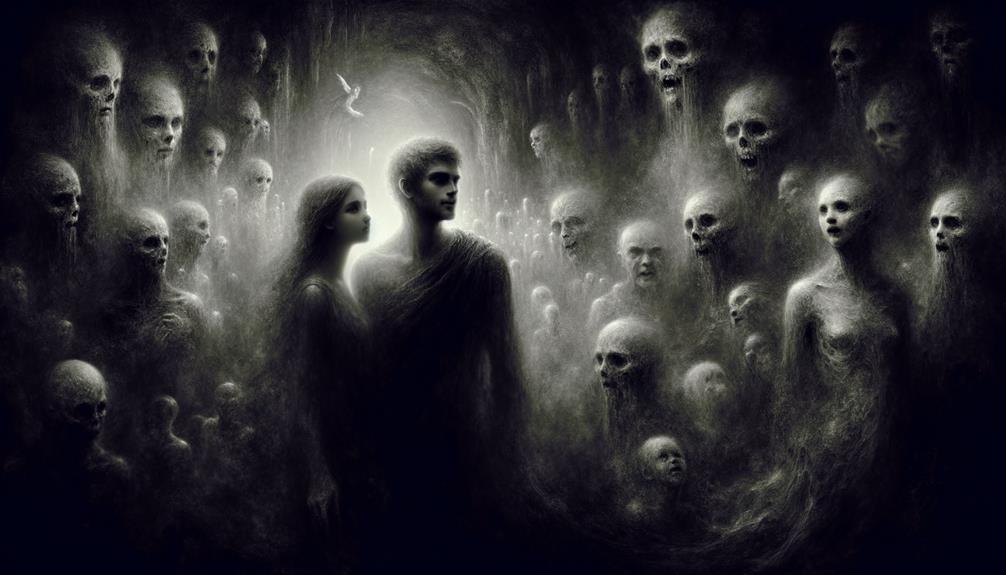
As we neared the boundary between shadows and light, nagging doubts eroded my determination, compelling me to steal that fatal glimpse that forever sealed Eurydice's fate. Our underworld journey had been treacherous, each step echoing Hades' stern condition: don't look back until we reach the surface. Yet, the silence behind me grew maddening, and the fear of losing Eurydice again consumed me.
In that fleeting instant, I, Orpheus, yielded to human frailty. The need to confirm Eurydice followed overshadowed Hades' warning. As our eyes met, a sorrowful understanding passed between us. Eurydice began fading, her form dissolving back into shadows, eternally bound to the underworld.
That fatal glance poignantly reminds, in Greek myth, of defying divine instructions' dire consequences. It highlights themes of loss, love, and death's permanence. My heart shattered realizing my mistake's gravity. Eurydice was lost to me, and that moment's weight would haunt me endlessly, a proof of humanity's fragile resolve.
Artistic Interpretations
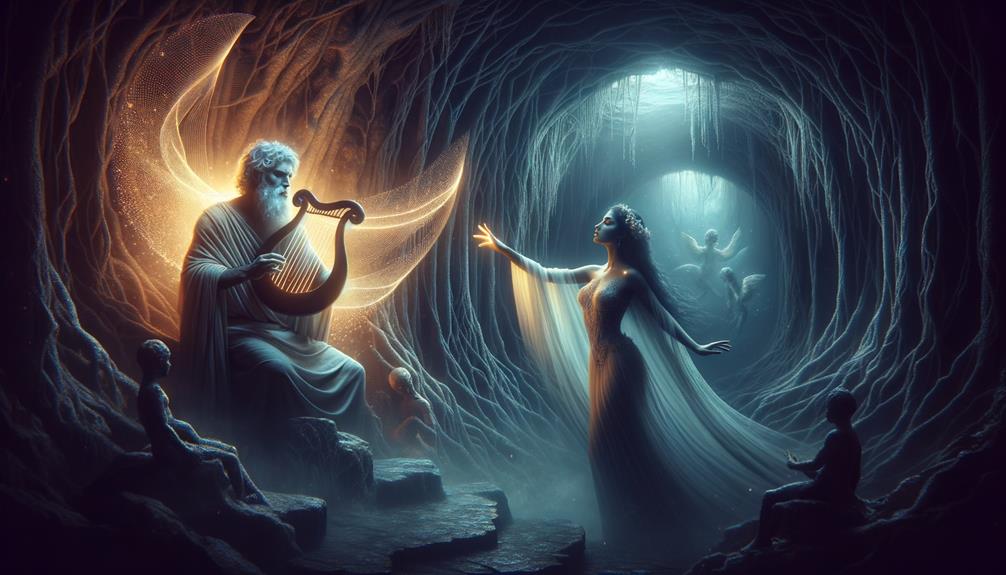
Artists spanning generations continue finding inspiration in the myth of Orpheus and Eurydice, each crafting a personal interpretation. Painters like Peter Paul Rubens vividly depict pivotal moments, his brush immortalizing Orpheus's ill-fated backward glance with heart-wrenching detail.
Composers bring our narrative to life through soaring melodies and rich librettos. Gluck's "Orfeo ed Euridice" opera captures Orpheus's anguish and heroic spirit, while Offenbach satirizes our struggles in "Orpheus in the Underworld." Every note resonates with timeless themes – love, loss, and hope's persistence.
Filmmakers also embrace our story's resonance. Cocteau's "Orpheus" recasts the myth through a surreal contemporary lens, whereas Camus's "Black Orpheus" transports our ancient tale to Rio's pulsing streets, blending cultural riches.
Canvas, stage, or screen – artists across mediums continue exploring and reinterpreting our profound journey, a testament to art's power to give voice to the expansive human experience.
Legacy of the Myth
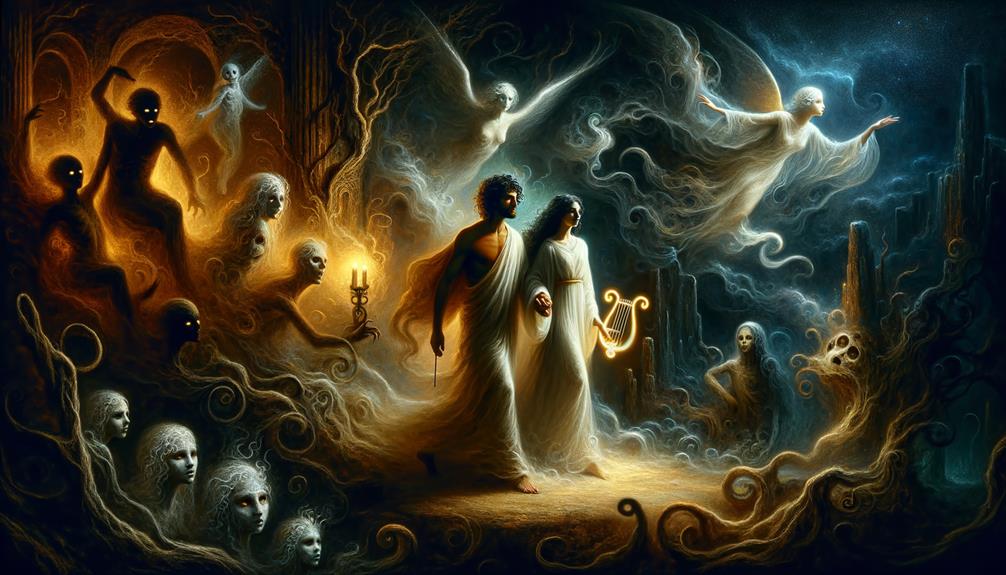
The story of Orpheus and Eurydice resonates because it touches on universal themes – love's battles against fate and death. Orpheus journeying to the underworld to reclaim his beloved Eurydice, only to lose her again, strikes a chord with everyone who has experienced loss and hope.
This centuries-old tale greatly influenced art and literature over time. Orpheus's mythical musical talents, charming even underworld deities, represent art's transformative power to move us deeply. His tragic ending – looking back and losing Eurydice forever – poignantly captures human vulnerability meeting divine forces.
The myth remains culturally relevant in these ways:
- Writers frequently revisit the tale, dissecting themes like love, sacrifice, and the afterlife.
- Musicians draw creative fuel from Orpheus's enchanting gifts, composing symphonies and operas.
- Films, TV shows, and visual arts reinterpret the backstory for modern audiences.
Our enduring fascination with Orpheus and Eurydice highlights the human desire to grasp love's mysteries and the world beyond this one.
Frequently Asked Questions
What Is the Story of Orpheus in the Underworld?
I journeyed into the underworld, driven by my love for Eurydice. My melodies swayed Hades and Persephone, allowing her return. But one backward glance sealed her fate anew. This tale embodies undying passion, searing loss, and the consequences of defying fate.
What Happens to Eurydice in the Underworld?
Eurydice tragically dies, descending into the underworld's murky depths. Her freedom hinges on her lover's unwavering faith, yet a fleeting moment of doubt sentences her to remain trapped within the shadowy realm.
Why Did Orpheus Fail to Save Eurydice From the Underworld?
I failed to bring Eurydice back because I let my doubts consume me when I should've held firm. A single moment of weakness – looking back despite being warned not to – doomed her to the Underworld forever. That experience taught me the grave price of giving in to fear rather than having faith.
What Does the Myth of Orpheus and Eurydice Explain?
The age-old tale explores the heart-wrenching aftermath of defying heavenly decrees, the profound power of affection and melody, and fate's inescapable grip. It serves as a poignant warning against doubt and impatience amid life's relentless struggles. Through Orpheus and Eurydice's journey, storytellers convey the depth of love's sacrifice while contemplating our unyielding battles against inevitability. The narrative transcends time, resonating with our shared human experiences.

